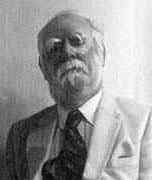Person: Higman, Graham

Graham Higman was an English mathematician who is known for his outstanding work in all aspects of the theory of groups.
Mathematical Profile (Excerpt):
- Higman's tutor was Henry Whitehead and it took a while before he realised that Higman was a natural pure mathematician since most students on a natural sciences scholarship would only take mathematics courses to support their science studies.
- Following a suggestion by Whitehead, Higman founded the Invariant Society (an Oxford undergraduate mathematical society).
- After taking special topic courses on group theory and differential geometry, Higman received an MA.
- After graduating Higman continued to study for his doctorate at Oxford.
- After his doctoral studies Higman spent a year at the University of Cambridge where he was strongly influenced by Philip Hall.
- At the end of the war Higman decided to apply for a permanent post in the Meteorological Office but, after being asked at an interview why he had not chosen to enter the academic world, he turned down the offered post and looked for an academic career.
- The offer from Manchester did come and, in 1946, Higman was appointed as a lecturer in mathematics at the University of Manchester.
- When he first arrived at Manchester Higman worked with Max Newman.
- Higman and Neumann collaborated proving a number of very significant results which we comment on below.
- Despite the large amount of activity in group theory which was going on in Manchester, Higman was ambitious and began to apply for professorships.
- Higman was appointed Waynflete Professor of Pure Mathematics at Oxford in October 1960 and, at the same time, he was elected a Fellow of Magdalen College Oxford.
- Immediately after he retired from Oxford, Higman went to the United States where he was George A Miller visiting professor at the University of Illinois for the two years from 1984 to 1986.
- Higman is known for his outstanding work in all aspects of the theory of groups.
- In 1949 Higman published one of several major pieces of work which stand as a landmark in the development of group theory.
- His paper Embedding theorems for groups written jointly with both Bernhard Neumann, who as we noted was a colleague of Graham Higman's at Manchester at that time, and with Hanna Neumann, introduces the now standard group construction of HNN extensions (Higman - Neumann - Neumann extensions).
- Higman published further important papers in 1951 when he gave an example of a finitely presented group which is isomorphic to a proper factor of itself, and Higman's famous example of a finitely generated infinite simple group.
- After working on finitely generated nilpotent groups and infinite simple permutation groups, Higman, together with Philip Hall, produced another of his landmark papers in 1956 On the p-length of p-soluble groups and reduction theorems for Burnside's problem.
- Higman made other contributions to the Burnside problem with a paper on groups of exponent 5.
- As a corollary to this theorem Higman proved the existence of a universal finitely presented group containing every finitely presented group as a subgroup.
- Higman also worked on topics such as: varieties of groups; enumerating ppp-groups; and Lie ring methods for finite nilpotent groups.
- Then in 1967 Higman became interested in the sporadic finite simple groups being discovered at this time and played an important role in constructing certain of these groups from a knowledge of their character tables.
- He published papers on the Higman-Sims simple group (named after D G Higman and not Graham Higman) and on Janko's group of order 50232960.
- Together with Bill Boone, Higman worked on the word problem and together they wrote two papers on the algebraic structure of groups with soluble word problem and with soluble order problem.
- Elizabeth Scott took notes of the course and the lecture notes were published as a joint Higman-Scott publication.
- Higman has received many honours for his outstanding work in group theory.
Born 19 January 1917, Louth, Lincolnshire, England. Died 8 April 2008, Oxford, England.
View full biography at MacTutor
Tags relevant for this person:
Algebra, Group Theory, Origin England, Puzzles And Problems
Thank you to the contributors under CC BY-SA 4.0! 

- Github:
-

- non-Github:
- @J-J-O'Connor
- @E-F-Robertson
References
Adapted from other CC BY-SA 4.0 Sources:
- O’Connor, John J; Robertson, Edmund F: MacTutor History of Mathematics Archive
